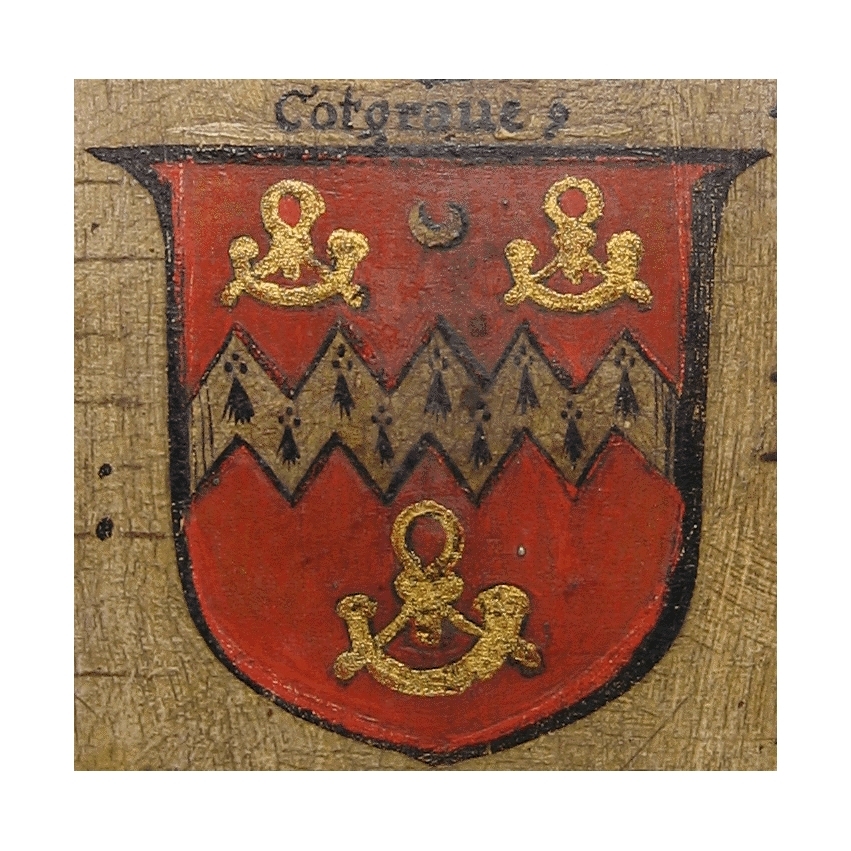Richard Cotgrave and his family seem to have been indecisive. They couldn’t decide whether they were well off or not. They couldn’t decide how to spell their surname. In Richards’ case, he couldn’t even decide how to spell his first name!
He was born in 1685, or at least that is when he was baptised in the church of St Botolph without the Aldgate in the city of London, although he later claimed to be older. His father Thomas was from a family of city freemen, but it seems their fortunes were perhaps not what they had once been. Nothing is known about Richard’s childhood, except that he had three brothers, all called Thomas, and all of whom died as infants. So by the time he was two, Richard was an only child.
When he was 27 (he said he was 30), he married a young woman called Catherine Gold. They could afford to by a licence (to avoid the delay of waiting for the banns), and perhaps they were in a hurry because he was about to go away to sea. In fact, he almost certainly already had done and was home on shore leave.
A week after the wedding, he made a will, describing himself as a “mariner now belonging to Her Majestry’s Ship Nightingale,” in which he left everything to Catherine. For the avoidance of doubt, he listed the sorts of things he might own as “all & every my Chest Cloaths lynnen wollen Bedding pewter Brass House holdstuff Goods and all and every my pay wages summe and sum’es of Money Lands Tenements Goods Chattells and Estate whatsoever as shall be any wages due oweing or belonging unto me at the time of my Decease”. He signed it Rcihard Cotgrave, with the C and the I in Richard in the wrong order. He made Catherine his sole executor. And off he sailed.
And nothing more was heard of him for three years. But on 25 August 1715, the log book of HMS Nightingale records that Able Seasman Richd Cotgrove had been Discharged Dead at Annapolis in Maryland in the American Colonies. No further wages would be paid from that date, but before his final salary was settled, the navy would deduct a little more than £3 for clothes supplied on the ship, 15 shillings for tobacco, £12/12/9 for other expenses including a chest, and 6 pence per month as a compulsory levy towards the seamen’s hospital in Greenwich, from which Richard could now never benefit. He was presumably buried somewhere in Maryland.
The news took some time to reach Catherine, but whatever she felt about the man she had barely seen for years, at least she had the knowledge that everything he owned would be hers, including years’ worth of wages (the total seems to be more than five years, which would have meant backdated pay since before the marriage). So the following January, Catherine Cotgrave widow was granted probate of Richard’s will in the Prerogative Court of Canterbury. But once she sorted through the returned possessions, including the chest that Richard had mentioned in his will and which was listed in the ship’s expenses, Catherine found a surprising new document.
On the day before his death, Richd Cotgrove had made a new will. He must have known he was dying – his signature is formed of scrawled initials quite unlike the carefully crafted letters of his previous writing. And in his final hours, he dictated a new set of bequests. His mother Elizabeth, a widow who must have been at least in her sixties, was left twenty pounds – almost a full year’s wages. Maybe that was fair enough. But there was also a bequest to “my Well beloved freind Mary Guinny”. It’s unclear who she might be, but he must have known her from home (there was a family called Guinny, whose father was a mariner in London at the time, and she must have been some sort of relation). Out of the £54 Richard was owed in wages, almost half had been left to people other than his wife.
Catherine might have accidently “lost” the new will if nobody was looking. But either they were, or she was too honest, because two months after the first probate, she was back in court with the second will. She was again the executor, so Richard must have believed that she would honour his wishes, and it seems that she did.
But she did not remain a Cotgrave for long. Catherine took the chest, the linen, the brass and pewter, any title to property and married Richard Chew within a year. They prospered, and when he died in the 1740s, his estate consisted primarily of “Mortgages, Bonds, Bills of Sale, Ready Money…and Notes of Hand”. But by now, he was on his second wife, called Elizabeth. And he left it all to her.
Sources
National Archives: ADM33/302; PROB10/1529 ; PROB11/550, 551, 719.
London Metropolitan Archives: MS 9225/2; 7894/3; 10091/48.
